Beyond the Mayflower
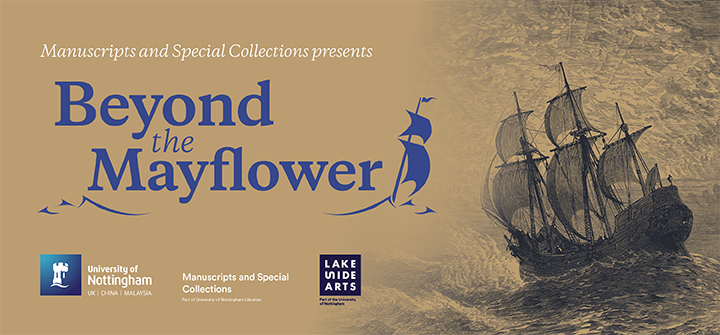
This exhibition ran from 23 September 2021 to 16 January 2022 in the Weston Gallery, Lakeside Arts Centre.
In 1620, a ship called the Mayflower sailed across the Atlantic. Amongst the passengers were a group of religious separatists, known as the ‘Pilgrims’, many of whom came from Nottinghamshire.
In this online version of the exhibition you can read the exhibition boards, listen to a podcast with sculptor Rachel Carter, read about the experiences of the Pilgrim settlers, and learn more about the records of the Archdeaconry of Nottingham.
Beyond the Mayflower was curated by Manuscripts and Special Collections and Professor Ross Wilson, Director of Liberal Arts at the University of Nottingham, with contributions by Dr Caleb Bailey and Rachel Carter.
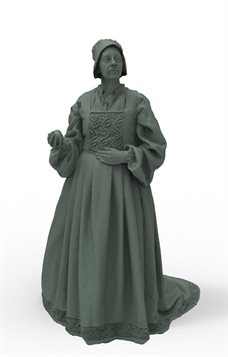
'Pilgrim Woman' by Rachel Carter
Exhibition boards
The Pilgrims from Nottinghamshire were part of a history that is more than the Mayflower. By understanding the wider history of religious dissent, we can explore issues of equality and freedom today.
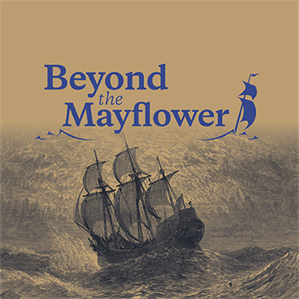
Six exhibition boards were on display in the Gallery, detailing aspects of religious history and tolerance.
Accessing items from our collections
Items from our collections are available to consult in the Manuscripts and Special Collections reading room on King's Meadow Campus.
You can search our catalogues to find items in the manuscript and printed collections relating to religion and migration.
Archdeaconry Resources
The 'Pilgrim Father' William Brewster of Scrooby, and Thomas Helwys of Broxtowe, founder of the Baptist Church, found themselves in trouble for their failure to comply with the established Church. The original Presentment Bills made by the churchwardens of their parishes, naming them as dissenters, have survived in the Archive of the Archdeaconry of Nottingham.
The archive is one of the most extensive manuscript collections held at the University of Nottingham. It is a major research resource for ecclesiastical court history, and touches on many issues of local church estates and property, parish and community concerns, family structure and individual lives. Genealogists make use of the series of marriage bonds dated 1565-1884.
More information about the Archdeaconry archive is available to view on our website.
Archdeaconry Resources web pages
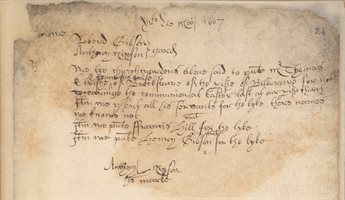 Churchwarden presentment bill naming Thomas Helwys ('Elvishe'), Bilborough parish, 1607 (AN/PB 293/7/24)
Churchwarden presentment bill naming Thomas Helwys ('Elvishe'), Bilborough parish, 1607 (AN/PB 293/7/24)
Turn the Pages
Of Plimoth Plantation
William Bradford's handwritten account of the Pilgrim Fathers' journey and settlement of Plymouth Colony is held at the State Library of Massachusetts and has been made available online.
University of Nottingham Library's own copy of a facsimile volume published in 1896 (Special Collection Over.X F68.B7) is currently displayed in the exhibition in the Weston Gallery.
Turn the pages: Of Plimoth Plantation
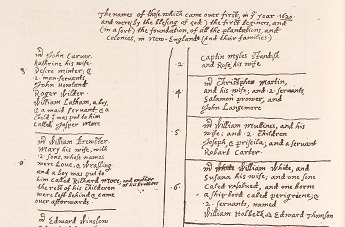 Facsimile copy of William Bradford's 'On Plimoth Plantation' (Special Collection Over.X F68.B7)
Facsimile copy of William Bradford's 'On Plimoth Plantation' (Special Collection Over.X F68.B7)
Tours, films and talks
Mayflower400 and Pilgrim Roots by Dr Anna Scott
This lunchtime talk, recorded at Lakeside Arts in Nottingham on 29 September 2021, explores the Mayflower Pilgrims' history, heritage and legacy and the ways in which the story has been mythologised, revised, and commemorated over the years.
The Making of a Pilgrim Woman by Rachel Carter
In this lunchtime talk, recorded at Lakeside Arts in Nottingham on 14 October 2021, artist Rachel Carter talks about her project inspired by her Nottingham ancestors in the textiles industry and the Pilgrims who fled aboard the Mayflower in 1620. The explorations, research and travels have culminated in a new bronze sculpture titled Pilgrim Woman and a major exhibition which is due to open at Lincoln’s The Collection this November.
Colonialism: Causes and Consequences of Contemporary Migration by Dr Caleb Bailey
As the world becomes ever more interconnected, migration becomes ever more fluid and complex and looks set to increase in the coming decades. Dr Caleb Bailey explores how forced migration has evolved. Migration during the colonial era had its roots in expanding territory, escaping persecution or seeking greater economic prospects. In today's world migration now increasingly involves drivers such as conflict, climate change, environmental degradation and food insecurity. This lunchtime talk was recorded at Lakeside Arts on 23 November 2021,
Religion, Politics and Exile in Early Modern England and Beyond, by Dr David Gehring
Dr David Gehring of the University of Nottingham provides a setting for understanding religious exile during the early modern period. The decision to leave one’s homeland was never taken lightly, but many sought religious freedom and liberty of conscience by making a home elsewhere. In this respect, the puritans of the Mayflower were continuing a tradition firmly identified with the Reformation but predating it by centuries.
Spirit of Mayflower podcast by Rachel Carter
Rachel’s podcast charts her journey to create a series of Pilgrim Woman Sculptures for the 400th anniversary of the Mayflower sailing and looks at the history, inspiration and the cultures of four nations.
Season 1, Episode 15 features special guest Kathryn Summerwill from Nottingham University Manuscripts and Special Collections, discussing the 'Beyond The Mayflower’ exhibition.
Listen to the podcast
Watch our series of short films introducing items from our collections
Beyond the Mayflower: 60 second summary
Focus on: William Brewster, Pilgrim Father
Focus on: Passengers on the Mayflower
From our blog
Visitor comments
Very helpful to see the reasons for the Mayflower journey in a wider context. I have an ancestor from Bedfordshire who sailed on the Mayflower.
I didn't know that the area around Retford was such a hotbed of dissent!
A fascinating display which makes me proud to come from Nottinghamshire! A history of rebellion.
Get the latest updates
Follow Manuscripts and Special Collections Exhibitions on twitter @mssLakeside to keep up to date with the latest exhibition news.